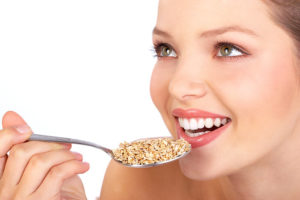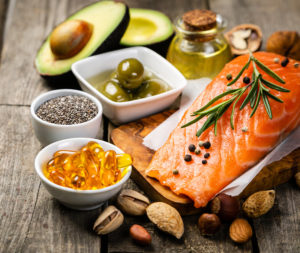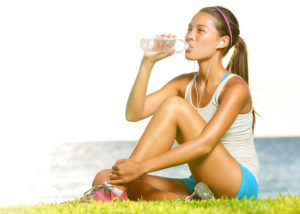Table of Contents
Getting all the nutrients your brain requires everyday doesn’t have to be complicated.
If you simply keep in mind a few specific nutrients, eating meals full of nutrient-dense foods can be simple.
Every day our body and brain require essential and non-essential nutrients.
Essential means it must come from our diet. And non-essential means our body and brain make these nutrients internally and as needed.
In this post, you’ll find which essential nutrients are part of a brain-boosting diet that you must get every day for a healthy brain. And some of the foods that provide these nutrients.
11 Essential Nutrients We Must Get from Food
For millennia, our human ancestors were getting all the nutrition they needed from what they gathered, grew or captured. Long before we invented dietary supplements and nootropics.
The following 11 essential nutrients were the same for your ancient ancestors as they are for you today.
And the foods they got them from are the same foods you can now find at your local supermarket.
But if the foods are the same, why do we need to take dietary supplements and nootropics for optimal health? We’ll touch on that at the end of this post.
-
Carbohydrates
Your brain needs an adequate, steady fuel supply. And it uses two main fuels, glucose or ketones, both of which can cross the blood-brain barrier.
 If you eat a diet moderate to high in carbohydrates, your brain’s main energy source is glucose. If you maintain a low carb or ketogenic diet, your brain’s main energy source is ketones.
If you eat a diet moderate to high in carbohydrates, your brain’s main energy source is glucose. If you maintain a low carb or ketogenic diet, your brain’s main energy source is ketones.
Research estimates your brain requires 110 – 145 grams of glucose from carbohydrates per day.[i]
Complex carbohydrates take longer to break down which can help you feel fuller longer and keep blood sugar levels regular.
Examples of complex carbohydrates which can be included in all three daily meals include:
- Oatmeal (old-fashioned or Steel Cut)
- Yams
- Brown rice
- White potatoes with skin
- 100% whole wheat bread
- 100% whole wheat pasta
- Beans and lentils
- Pumpkin, butternut squash, beets
-
Calcium
Over 99% of your body’s calcium is found in bones and teeth. Calcium is also involved in muscle contractions, nerve function and bodily blood movement.[ii]
In your brain, calcium regulates neurotransmitter synthesis and release, neuronal excitability, and is involved in long-term potentiation for long-term memory formation.[iii]
Sources of calcium which can be included in all three daily meals include:
- Dairy products
- Leafy greens
- White beans
- Sardines and salmon
-
Fat
Fat is an essential nutrient because it provides energy, boosts absorption of some vitamins and helps protect against organ damage.
Unsaturated fats are ideal because they also help protect your heart. Trans fats found in processed food, and baked goods must be avoided because it significantly increases heart disease.[iv]
Healthy sources of unsaturated fats that can be included in all three daily meals include:
- Nuts
- Coconut
- Almond
- Sunflower
- Sesame
- Ghee
- Avocados
- Salmon
- Olive oil
- Flax seed
- Nut butters
-
Minerals
Like vitamins, minerals are critical for your body and brain to function optimally.
 Your body requires daily supplies of boron, calcium, chromium, copper, iodine, iron, magnesium, manganese, molybdenum, phosphorous, potassium, selenium and zinc.
Your body requires daily supplies of boron, calcium, chromium, copper, iodine, iron, magnesium, manganese, molybdenum, phosphorous, potassium, selenium and zinc.
Each of these minerals plays a part in neurotransmitter and hormone synthesis, protects against free radicals, acts as an antioxidant, boosts ATP production, synapse creation, myelin synthesis, and RNA and DNA synthesis.
Good sources of minerals from food that can be included in all three daily meals include:
- Cheese
- Milk
- Yogurt
- Salt
- Spinach, and other dark leafy greens
- Broccoli
- Tofu
- Dark chocolate and cocoa powder
- Dried fruits
- Salmon
- Legumes and beans
- Seeds
- 100% whole wheat bread
- Shellfish and seafood
- Nuts
- Teas
- Whole grains
- Mushrooms
- Beef, lamb and pork
- Chicken and turkey
- Bananas
-
Omega-3
Omega-3 fatty acids are a type of polyunsaturated fat that are considered an essential fatty acid. Meaning our body cannot make it and we need to get it from food.[v]
 Omega-3s are made up of DHA (docosahexaenoic acid) and EPA (eicosapentaenoic acid). Your brain is composed of 60% fat. 15 – 20% of your cerebral cortex is DHA. Even the retina in your eyes is 30 – 60% DHA. Making DHA the most essential nutrient for eye and brain health.
Omega-3s are made up of DHA (docosahexaenoic acid) and EPA (eicosapentaenoic acid). Your brain is composed of 60% fat. 15 – 20% of your cerebral cortex is DHA. Even the retina in your eyes is 30 – 60% DHA. Making DHA the most essential nutrient for eye and brain health.
Ideally, you should get at least 1,500 mg of Omega-3s per day which means 2- 3 servings of fish per week. Or a high-quality Omega-3 supplement that contains minimum 1,000 mg DHA daily for optimal brain health.
Omega-3s from sources other than seafood do not supply enough fatty acids.[vi]
Sources of Omega-3s available from food that can be included in three daily meals include:
- Salmon
- Mackerel
- Sardines
- Chia seeds
- Flax seeds
- Walnuts
-
Potassium
Potassium is an essential mineral for life and the most abundant cation (positively charged ion) in your body.[vii]
The sodium-potassium pump is necessary for action potentials within neurons. And when you have a deficiency of potassium, the result is brain fog, fatigue and depression.[viii]
You can get the potassium you need by included the following foods in at least one or two of your three daily meals:
- Spinach
- Dried apricots
- Dates
- Dark leafy vegetables
- Mushrooms
- Tomatoes
- Potatoes
- Avocados
- Salmon
- Sweet potatoes
- Bananas
-
Protein
Proteins are needed to form muscle and provide the amino acids for synthesis of neurotransmitters. As well as other enzymes and hormones you need for optimal health.
Nine out of a total 20 types of amino acids are considered essential which include:
- Histidine
- Isoleucine
- Leucine
- Lysine
- Methionine
- Phenylalanine
- Threonine
- Tryptophan
- Valine
Food from animal proteins provide the amino acids our body and brain need every day. Plant-based proteins typically lack some of these essential amino acids.
Sources of protein to provide the amino acids we need are found in these foods which should be included in three daily meals:
- Beef, chicken, bone broth
- Lentils, kidney beans, chickpeas, black beans
- Oats, wheat, amaranth
- Wild salmon, catfish, carp, trout, bass, drum, tuna, anchovies, sardines, snapper, cod, mackerel, herring
- Nuts; cashews, almonds, pistachios, walnuts, peanuts
- Seeds; flax, sesame, chia, sunflower
- Coconut
- Natto
- Eggs
- Yogurt, curd, paneer, goat cheese
-
Sodium
 Sodium is critical for fluid balance, blood volume, and for your nerves and muscles.
Sodium is critical for fluid balance, blood volume, and for your nerves and muscles.
In your brain, sodium atoms control when kainite receptors get turned on and off. This sodium switch is unique to these receptors. The malfunction of kainite receptors is implicated in epilepsy and neuropathic pain.[ix]
But too much sodium (the main component in table salt) increases levels of proinflammatory interleukin-17 (IL-17). Which leads to brain blood vessel dysfunction affecting cerebral circulation. And results in cognitive decline.[x]
Sodium from processed foods, salty snacks, and canned meats should be kept to a minimum.
Sodium is found naturally in many foods, including:
- Seeds
- Nuts
- Vegetables
- Meats
- Grains
- Legumes
-
Vitamins
Vitamins are a group of organic compounds essential for human life but are not synthesized in your body. So, you need to get adequate amounts of all 13 vitamins from your diet, or as a supplement.
 We require four fat-soluble vitamins A, D, E and K. And nine water soluble vitamins which include Vitamin C, and the eight B-Vitamins; thiamine (B1), riboflavin (B2), niacin (B3), pantothenic acid (B5), pyridoxine (B6), biotin (B7), folate (B9) and cobalamin (B12).
We require four fat-soluble vitamins A, D, E and K. And nine water soluble vitamins which include Vitamin C, and the eight B-Vitamins; thiamine (B1), riboflavin (B2), niacin (B3), pantothenic acid (B5), pyridoxine (B6), biotin (B7), folate (B9) and cobalamin (B12).
Although most vitamins in your diet are derived from plants, you often get them from higher up the food chain including meat, dairy and eggs.
But the best way to get all of these vitamins is to eat a healthy and balanced diet with plenty of fruits and vegetables with each of your three daily meals.
For more on vitamins and your brain, see my post, “13 Vitamins Essential for the Optimized Brain”.
And note that when taking fat-soluble vitamins like some of the B’s mentioned here, Vitamin D, Vitamin A, and Vitamin E that they must be taken with a healthy fat for transport past cell walls.
You can take your vitamins with a tablespoon of unrefined coconut oil, or extra virgin olive oil to ensure absorption. My preferred healthy fat is a tablespoon of the new organic, non-GMO Performance Lab® MCT Oil.
-
Vitamin D
Also known as the “sunshine vitamin”, Vitamin D3 is necessary for absorption of calcium for good bone health. And Vitamin D3 strengthens your immune system[xi] and influences muscle function.[xii]
In your brain, Vitamin D3 is involved in the synthesis of GABA, glutamate, glutamine, and serotonin.[xiii] It protects against DNA damage through prevention of telomere shortening and inhibition of telomerase activity. And prevents oxidative damage to DNA.[xiv]
And Vitamin D3 is involved in neuromodulation, regulation of neurotrophic factors, neuroprotection, neuroplasticity, and brain development. All in areas of the brain associated with depression.[xv]
If you have dark skin, are obese or get limited sun exposure because you use sunscreen, wear excessive clothing, or don’t go outdoors much, you are at greater risk of Vitamin D3 deficiency.
You can also get some Vitamin D3 in your three daily meals from:
- Mushrooms (Shiitake)
- Egg yolks
- Beef liver
- Fish (salmon, mackerel, sardines, cod liver oil)
But if you don’t get enough sun exposure or eat plenty of the above foods, you should supplement with Vitamin D3.
-
Water
You can do without food for a while but only a few days without water. It makes up 75% of body weight in infants to 55% in the elderly.[xvi] Your brain is 80% water.
 Water plays a critical role in waste removal from your body, digestion, temperature regulation, and makes up a core component of every cell in your body.
Water plays a critical role in waste removal from your body, digestion, temperature regulation, and makes up a core component of every cell in your body.
Dehydration results in symptoms such as dry skin, dizziness, fatigue, rapid heartbeat, and left untreated in death.
Even mild dehydration can impair cognitive performance and mood.[xvii]
One British study showed that students who took water to the examination hall scored an average of 5% higher exam scores that those who didn’t take water.[xviii]
Another cross-sectional study with a total of 3,327 Iranian adults showed that drinking plain water deceased anxiety and depression.[xix]
An yet another analysis of 33 clinical studies showed that even mild dehydration impairs cognitive performance, attention, and executive function.[xx]
No country has managed to develop a Recommended Daily Allowance (RDA) for water. But we need water throughout the day. And the purer the source the better.
Why Food Isn’t Enough: Why We Need Nootropics
The United States Department of Agriculture (USDA) frequently releases a “Nutrition Facts” spreadsheet detailing vitamin, mineral and fat content for thousands of foods.
The latest (2016) USDA Simplified Nutrition Facts spreadsheet can be seen here.
If you compare that document with the same information from 50 years ago, you’ll soon come to a scary realization.
Our ancestors ate wild foods with dramatically higher levels of all essential fats, minerals, amino acids and vitamins.
And because of industrial farming techniques, depleted soil, and poorer air quality, our food today has significantly fewer nutrients. Processed foods have even less nutrients.
The World Health Organization (WHO) has estimated that more than 2 billion people worldwide experience deficiencies in the intake of essential vitamins and nutrients.
And in the USA, the Department of Health and Human Services and Agriculture has found the general population deficient in Vitamin A, Vitamin C, Vitamin D3, Vitamin E, choline, calcium, magnesium, iron and potassium.[xxi]
Of course, you’ve seen the headlines proclaiming dietary supplements are useless. Or even worse could be harmful.
But looking at the backers behind these statements and you soon find it’s Big Pharmaceuticals and others who make a living on us being sick.
Big money often drowns out the voice of reason.
But if you listen closely, you’ll find more and more open-minded health professionals saying you must eat a healthy diet. But you also must take supplements to maintain optimal health.[xxii]
You simply cannot get all the nutrients you require from food no matter how good your diet.
For more on why we need to supplement for optimal health, see my post “Nootropic Foods – the Effects of Nutrients on Brain Function”.
And this is the best whole-food multivitamin/mineral supplement on the market today: Performance Lab® NutriGenesis Multi for men or women. My wife and I use have been using this Multi daily for the last 3 years and it is by far the best multivitamin I’ve ever used. Highly recommended.






Join The Discussion - 3 comments
Ellie
July 30, 2024
Have you looked into recommending avoiding PUFAs (polyunsaturated fatty acids) such as those that come from highly processed seed oils, as, even though they are “unsaturated,” they can cause oxidative stress? I’ve also heard that more recent research shows that saturated fats (especially of a higher quality) are not the enemy people once thought they were. Just food for thought.
David Tomen
August 1, 2024
Ellie, Polyunsaturated fatty acids (PUFAs) are a type of fat that are considered “healthy fats” and are good for heart and brain health. They certainly are NOT highly processed seed oils. It is saturated fats and trans fats that are the problem.
You get polyunsaturated fatty acids from fish and other sea food, and healthy nuts like walnuts and sunflower seeds. I suggest avoiding soybean oil because they are genetically engineered and corn oil for the same reason.
Karin and Bernie Tarte
July 9, 2019
Dear David,
Thank you for all the incredibly valuable information!!
My mother died just before her 69th birthday – 11 years suffering with Alzheimer’s. The recent info on choline has been priceless for my husband (71) and myself (66)! Within the 1st day of taking 1 250 mg. capsule Citicoline by Amazing Formulas our lives have changed for the BETTER! We both noticed instant better eyesight with clearer distant viewing, along with the ‘overwhelm’ being replaced with ease in being able to focus, concentrate and Get Things Done (procrastination is out the window!) You are An Angel From Heaven – Thanks from the bottom of our hearts!